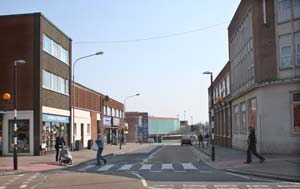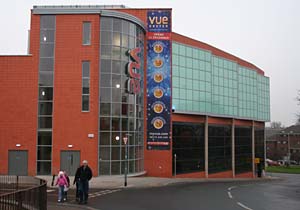
Cheeke Street
Page updated 10th July 2011
Named after the Cheeke or Chick family of St Sidwells, a prominent family of brewers from Elizabethan times onwards. The street was developed during the 19th-century on their land, as St Sidwells expanded with the burgeoning brick works in Newtown and Blackboy Road.
Sidwell Street had 19 deaths from the cholera in 1832, while Cheeke Street suffered six – in 1834 there were another four dead in a side alley – as a result, a new well was sunk in the street for clean water. In 1832, the street was still relatively underpopulated, as it served the rear of many premises in Sidwell Street. Twenty years later, the street had seen the development of the many courts which characterised the street later in the century.
The Cheeke Street post
In 1864, when there were two petitions, one to stop traffic entering from Paris Street as it was so narrow, and one to widen the entrance for traffic. The Streets Committee were not able to ascertain whether there was a right of way through the street. At the next meeting, after members had visited the street, they reported that once there had been posts placed to prevent traffic passing up the street at the entrance in Paris Street, and at one point, the found the roadway was only 5ft 9 inches (1.75 metres). The committee agreed to have a post fixed in place, but it was immediately removed, to be replaced by two more.
A year later, and there was an inquiry, with a jury into the matter of the post and the right of way. It was claimed that there had been a hinged post, but that it had been removed twenty years previously. The Bullers Arms and Poltimore Inn both had deliveries through Cheeke Street, and a fixed post would prevent this. The jury found for the defendants, who wanted free access. About 15 years later, the question of the post was revived after a child was crushed to death by a cart at the entrance to Cheeke Street from Paris Street. In the same year, plans were drawn up to widen the carriageway to 30 ft.
Improvements
The people of Gill's Court were the lucky recipients of a scheme to provide toilet amenities, in 1898, when the Sanitary Committee agreed to engage Messrs. A S Rowe to construct a facility at a cost of £6 10s.
There was a Cheeke Street School on the corner of Paris Street which, in 1871, had 53 boys and 41 girls enrolled. It was a mixed school, supported by the Plymouth Brethren, who had refused Government funding. By 1880, the school roll was 123. The school eventually became the Elim Church. Nos. 6 and 7 Cheeke Street sold for £170, the pair, in 1892.
World War One Dead - Cheeke Street
Lance Corporal,
Christopher Mann, Devonshire Regiment. October 1916. Age 27. Gill's
Cottages, Cheeke St
Serjeant, Reginald Northam, Devonshire Regiment.
25 September 1915. Age 26. Cheeke St
Private, J P Webber,Devonshire
Regiment. 1 March 1919. Cheeke St
The modern Cheek Street does not follow the old line, as the whole area was raised to the ground during the 1942 bombing. The new street crosses the line of the old Cheeke Street, from Sidwell Street down to the Paris Street roundabout. The new Vue cinema acts as a full stop when looking down Cheeke Street from Sidwell Street. One side of the bus station fronts Cheeke Street and is the main entrance for buses and coaches.
 Cheek Street from Sidwell Street.
Cheek Street from Sidwell Street.
 The Vue Cinema, the latest addition to
Cheeke Street.
The Vue Cinema, the latest addition to
Cheeke Street.
Cheek Street
Courts & Places
Gill's Court/Buildings
Union Lane
(built 1822)
Stover Place
Stone's Court
New Place
Alexandra
Place
│ Top of Page │